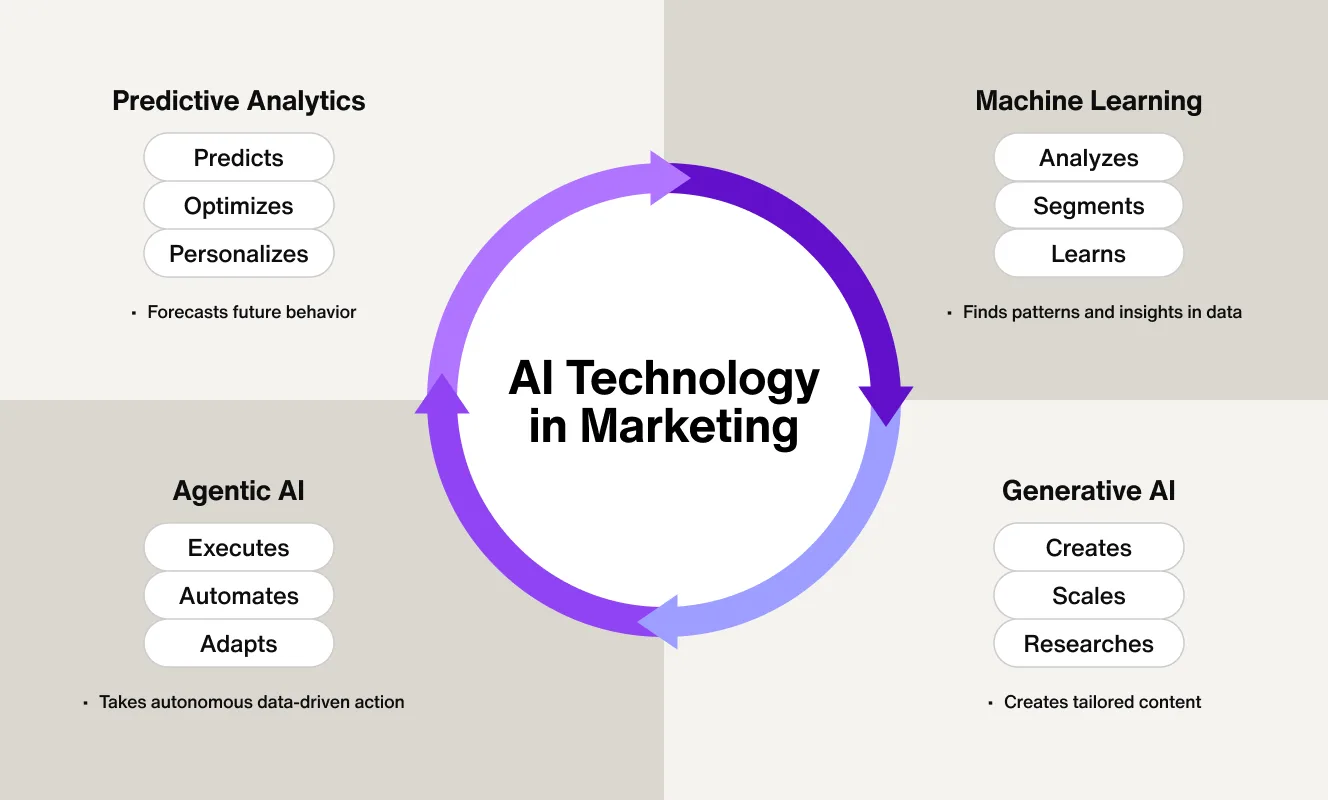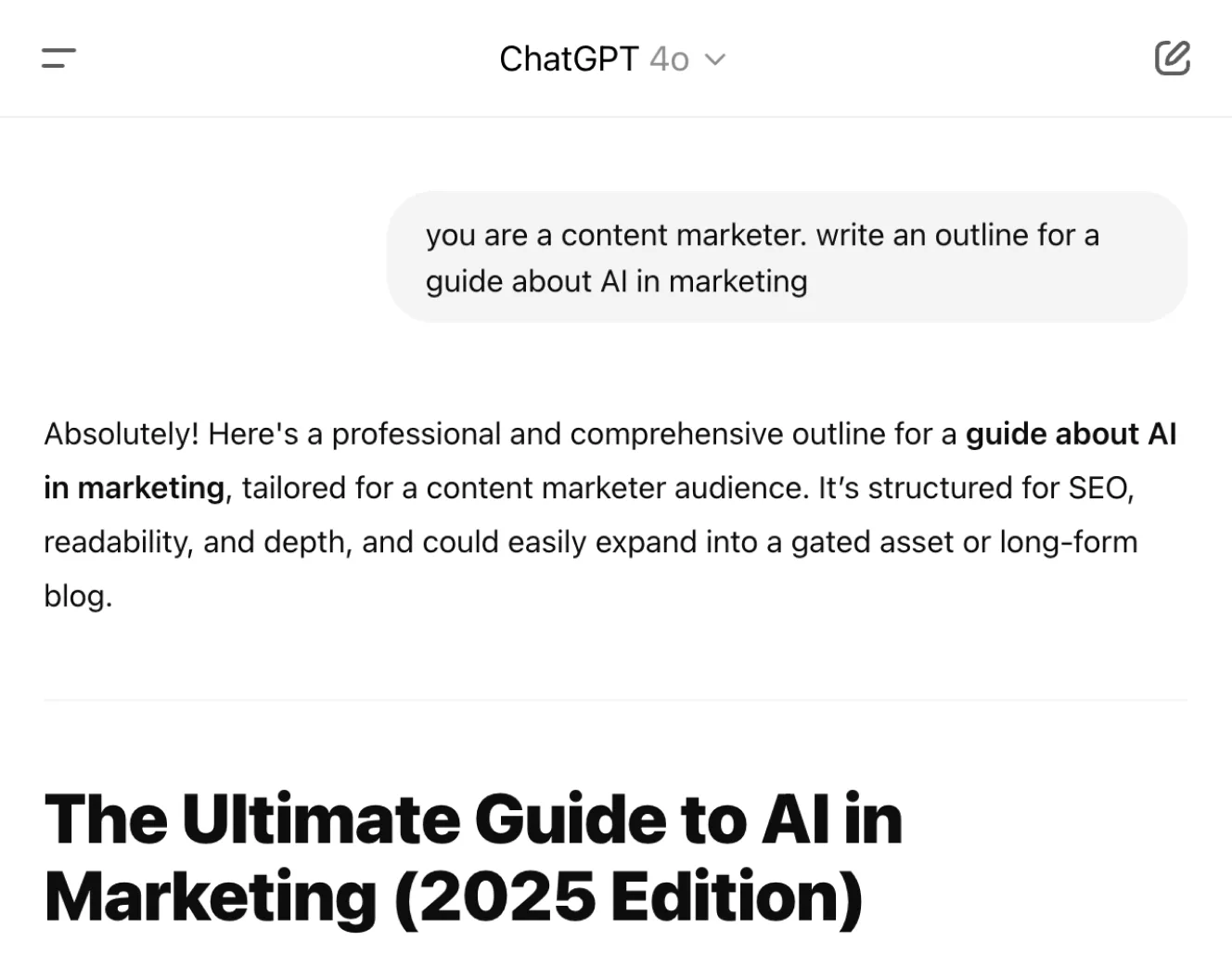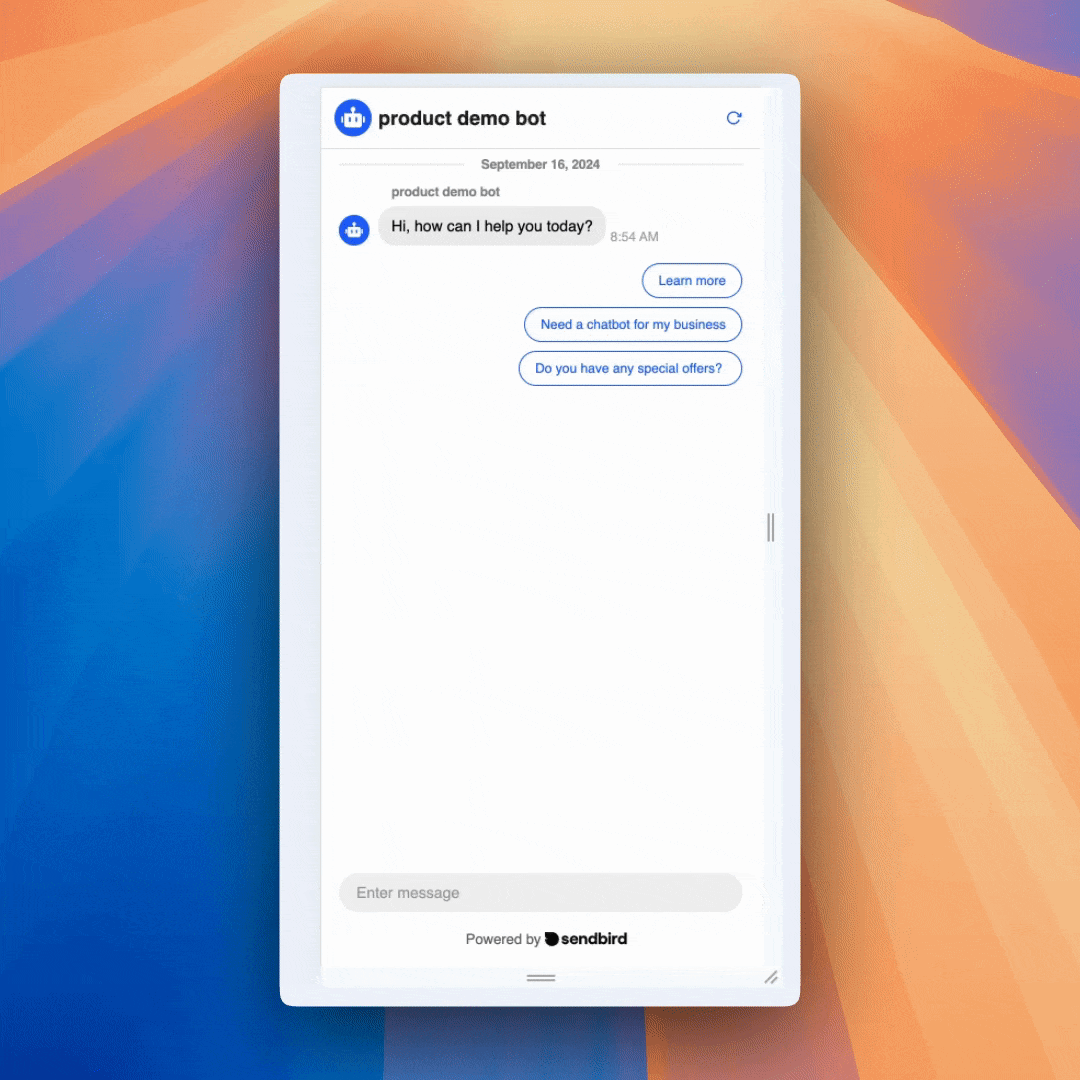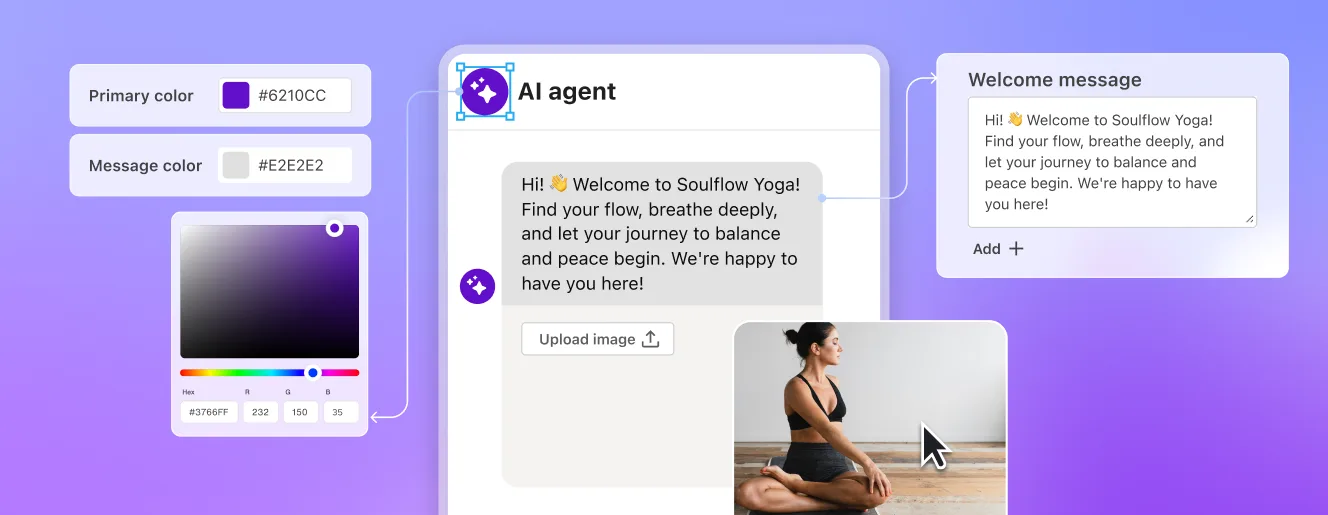AI in marketing: The complete guide for 2025 (Use cases, examples, strategy)

As a marketer, if I told you that you could do less repetitive work, be more strategic, get better results—all while saving your budget—would you take a free demo? Jokes aside, this is the transformative power of AI in marketing.
In a basic sense, AI enables marketers to use big data intelligently at scale. By analyzing vast datasets, AI algorithms identify patterns and insights to inform decision-making. Meanwhile, tools like AI agents—software that act autonomously using data in real time—apply these insights to automate processes, optimize campaigns, and scale personalization in exciting new ways.
Just a few years after the release of ChatGPT, AI is fast becoming the new engine of high-performance marketing. Nearly 9 in 10 marketers use AI daily, and 69% even say they’re excited about it. Riding this wave of enthusiasm, the market size of AI in marketing is expected to grow at a staggering rate of 26.7% CAGR through 2034.
With AI becoming table stakes in marketing, the question is—What are the best ways to use AI? What pitfalls should you avoid? Which tools do you need to succeed?
This guide will answer these questions using the latest data from industry leaders. Read on to learn the top AI use cases, benefits, best practices, and tools B2B and B2C marketers need to stay competitive.

8 major support hassles solved with AI agents
What is AI in marketing?
AI in marketing refers to the use of large language models (LLMs), machine learning, agentic AI, and other AI technologies to automate, optimize, and scale marketing activities. This includes analyzing data, generating content, optimizing campaigns, scaling personalization across channels, and more.
By processing data from various sources, AI helps marketers to:
Attract the right audience through predictive targeting
Educate prospects with tailored, high-quality content
Convert leads with smarter automation and more engaging, relevant experiences
Retain customers with more timely, tailored, and seamless interactions
Useful across processes from email marketing to content creation to social media, AI ultimately allows marketers to do more in less time, making it a key driver of ROI. By incorporating AI into core functions, marketing teams can improve efficiency, performance, and customer experience (CX)—all while gaining a competitive edge in the increasingly AI-driven landscape.
Types of AI in marketing
AI technology in marketing falls into four main buckets:

Predictive analytics: Scrapes online data to predict trends, customer sentiment, and behavior like churn or sales forecasts to proactively adjust and optimize efforts.
Machine learning (ML): AI algorithms process vast and diverse datasets to identify trends, patterns, and insights to inform decision-making and automation.
Generative AI (Gen AI): Creates text, images, or video as prompted using natural language processing (NLP). Also interprets, summarizes, and explains multimodal data for research, brainstorming, and branding.
Agentic AI (AI agents): Autonomous entities that reason, use data, and perform actions on behalf of other marketing systems in real time. They integrate seamlessly across channels, are context-aware, and enable personalized omnichannel experiences at scale.

Automate customer service with AI agents
How are marketers using AI?
AI offers a powerful new set of tools that help marketers be more productive, creative, and effective. According to recent research by SurveyMonkey, the most common ways marketers are using AI include:
93% use it to generate content faster
81% use it to research and uncover insights more quickly
90% use it for faster decision-making
Despite concerns about job loss, AI isn't replacing marketers. Instead, it’s shifting how they work, away from repetitive tasks and toward strategic efforts while putting more data, creative tools, and automation at marketers’ fingertips.
AI isn’t new in marketing, but it has gotten more powerful, accessible, and diverse in recent years. For example, Amazon and Netflix have both used predictive analytics for years, anticipating customer wants with algorithmic precision. But ever since ChatGPT landed in 2022, AI adoption has skyrocketed, and the use cases and marketing stack for AI have continued to evolve rapidly.
Now that you have a basic understanding of AI, what are the top ways marketers are using AI in 2025?
11 use cases and tools for AI in marketing
AI can handle a variety of tasks traditionally performed by marketers—only in less time, with greater precision, and at a fraction of the cost. According to one study, of the 85% of B2B marketers using generative AI, 76% say they are satisfied or very satisfied with the results.
To determine the best ways to use AI in marketing, I reviewed the latest industry surveys and data from SurveyMonkey, Hubspot, and others. Also included are the top AI tools for marketers that correspond to each top use case so you can get started right away.
1. Optimizing content
The leading way marketers are using AI is to optimize content, according to SurveyMonkey. Rather than just churning out countless words with ChatGPT, over half (51%) of marketers use AI to optimize their content.
AI can help optimize content in various ways. Depending on your chosen tool, this can include adding SEO keywords to content automatically, repurposing content for different channels and audiences, suggesting revisions to the voice, structure, and style of content to boost performance, and more.
🛠️ Top AI tools for content optimization:
Tool | Best for | Why it’s great |
Recommending keywords and structures to boost SEO. | Real-time tips, content audit feature, SERP analyzer | |
Improving grammar, style, and readability of content | Citation generator, AI detection feature | |
Improving SEO with topic and structure suggestions | Topic finder tool, seamless SEMrush integration |
2. Creating content
The second most popular way (50%) of using AI in marketing is content creation. By feeding a generative AI tool a prompt, marketers can create reams of content in seconds that’s tailored to specific audiences or channels, This helps marketers create web copy, blog content, social posts, and campaign plans, as well as images, video, or audio content.

Whether used for ideation, outlining, or crafting content, the majority of marketers use gen AI as a starting point. AI can confidently generate false or misleading information (aka hallucination), so it's essential to review its outputs for accuracy, human-ness, and brand alignment. According to Hubspot, only 6% of marketers publish AI-generated content without revisions.
🛠️ Top AI tools for content creation:
Tool | Best for | Why it’s great |
Generating tailored copy and marketing content. | Comprehensive platform, SEO integration, templates | |
Creating headlines, social posts, and email copy quickly. | AI writing assistant, user-friendly interface, live editing | |
Transforming text into visual content | Customizable designs, collaboration features |
3. Brainstorming content
AI models are trained on huge swathes of human knowledge, making them effective at generating ideas and sparking inspiration. A full 45% of marketers use AI to brainstorm concepts and ideas.
By prompting AI tools to assist with ideation, teams can rapidly find ways to inspire content, campaigns, or experiences. One of AI’s hidden values is its ability to reveal unseen connections between ideas in its training data, potentially offering up novel ideas, insights, or turns of phrase that can ignite creativity.
🛠️ Top AI brainstorming tools:
Tool | Best for | Why it's great |
Brainstorming integrated with your workspace | Seamless Notion integration, goal breakdowns | |
Versatile and intuitive brainstorming partner | Dynamic idea generation, custom responses | |
Specialized brainstorming for marketing content | Channel versatility, campaign theme suggestions |
4. Automating tasks
Automation is the fourth most popular use case for AI in marketing, with 43% of marketers using AI tools to automate manual tasks and workflows. This can include summarizing articles, scheduling meetings, social media management, or taking meeting notes.
According to a study from Hubspot, business professionals save an average of two hours and 24 minutes per day by using automation tools like AI, helping them get more done and focus on higher-value activities.
🛠️ Top AI automation tools:
Tool | Best for | Why it's great |
All-in-one AI-driven marketing automation platform | Workflow automation, integrated CRM data | |
Personalized cross-channel automation | Journey builder, automation studio | |
AI-driven social media automation | Content recycling feature, visual scheduling |
5. Analyzing data
41% of marketers use AI to streamline the vital task of data analysis. AI algorithms can analyze huge datasets, even unstructured data like social media and email, to identify insights in big data that humans can’t. This helps marketers understand customers and market conditions at a deeper level, providing more accurate, comprehensive data that leads to better decision-making and performance.
AI-driven analytics tools are increasingly embedded in leading marketing platforms, or they can be standalone tools. Depending on your chosen tool, AI can summarize and organize insights, predict behavior, segment audiences dynamically, and personalize experiences at scale.
🛠️ Top AI analytics tools:
Tool | Best for | Why it's great |
Behavioral analytics and predictive insights | Advanced funnel analysis, real-time segmentation | |
Automatic data capture and journey mapping | Comprehensive event tracking, retroactive analysis | |
Marketing insights plus personalization | Unified customer profile, predictive optimization |
6. Conducting research
4 in 10 marketers use AI to conduct research, making it the sixth most common way to use AI in marketing. Using NLP, AI can scan and summarize vast amounts of text or multimodal content from websites, social media, reports, customer feedback, and competitor content. By highlighting themes, patterns, and insights in data, AI gives marketers a clear understanding of customers, competitors, or industry trends in seconds.
AI-driven research tools come in many flavors: audience research, market research, competitor research, sentiment analysis, or predicting customer behavior. They all make short work of a traditionally time-consuming process, and provide more comprehensive, accurate analysis to enhance decision-making and performance.
🛠️ Top AI research tools:
Tool | Best for | Why it's great |
Real-time social listening and sentiment analysis | Extensive scope of sources, advanced sentiment analysis | |
Consumer survey insights supercharged by AI | Instant access to survey data, audience profiling | |
Comprehensive competitor intelligence | Real-time monitoring, insight summarizations |
7. Chatbots and AI agents
Chatbots have become ubiquitous on the websites of top brands, making them one of the most widely adopted forms of AI in marketing. Powered by NLP and available 24/7, these virtual assistants can answer common questions, nurture leads, recommend products, schedule demo calls, and even deliver timely, targeted promotions. The next generation of chatbots are AI agents—which Deloitte predicts will see 50% adoption among enterprise businesses by 2027.
AI agents provide a more seamless, personalized experience than previous bots. By accessing CRM data in real time, integrating across channels, and maintaining context between interactions—agents can tailor experiences based on historical data and real-time context. Effectively, agents can remember and adapt to each customer on the fly, delivering one continuous journey in which users never have to re-enter information when switching channels. Well-suited for campaigns, lead generation, sales, or AI customer service, agents help to improve engagement, conversion, and retention by making the customer experience more convenient, relevant, and rewarding.

🛠️ Top AI agent tools:
Tool | Best for | Why it's great |
Omnichannel customer engagement and support | Omnichannel continuity, seamless integrations | |
Lead qualification with conversational AI | Lead qualification and routine, real time chatbots | |
Memory-based AI assistant | Customized memory stack, automated communications |

Leverage omnichannel AI for customer support
8. Social media engagement
In these last few use cases, we’ll shift our focus to how marketers feel about the AI tools they’re using. First off, 43% of marketing pros using AI say it’s essential to their social media strategy.
AI tools for social media track and analyze online conversations and brand mentions, gathering real-time insights into customer sentiment and market trends from a comprehensive range of sources. This helps improve customer engagement, decision-making, and brand reputation without the legwork and coverage gaps of traditional social listening tools.
🛠️ Top AI engagement tools:
Tool | Best for | Why it's great |
Unified social media management | Enterprise-grade governance, AI agent integrations | |
Social analytics and monitoring | Real-time listening and sentiment, trend detector | |
In-depth monitoring and analysis | Comprehensive sentiment and emotion analysis |
9. Personalization
A full 73% of marketers say AI plays a key role in delivering a personalized customer experience. Indeed, AI agents have taken personalization to new heights. By continuously analyzing historical and real-time behavioral data across channels, agents can adapt personalization strategies on the fly—to deliver the most relevant, engaging experience for that exact moment.
Say a customer who previously read a blog about vacationing in Greece clicks an ad for beach resorts in Mexico. Recognizing this shift in interest, the agentic AI system adjusts in real time—whether to deliver tailored content, targeted promotions, dynamic web experiences, or trigger campaigns that align with the latest context. By making it feasible to scale 1:1 personalization, AI agents help marketers to build stronger relationships, drive engagement, increase conversion rates—all while raising the bar on CX.
🛠️ Top AI personalization tools:
Tool | Best for | Why it's great |
Personalized omnichannel engagement and support | Integrates with top platforms, proactive support | |
Real-time content personalization | Behavioral and contextual targeting, CX consistency | |
AI-driven experience optimization | Predictive analytics, content intelligence feature |
10. Search engine optimization (SEO)
Semrush reveals that 65% of companies have seen better SEO results when using AI. Instead of manually auditing keywords, backlinks, or technical issues, marketers can use AI tools to automate the process of analyzing and identifying what’s working and what isn’t.
Useful in optimizing content structure, suggesting SEO-friendly headlines, and analyzing search trends, AI-driven SEO tools help marketers improve content performance and meet evolving standards in less time.
🛠️ Top AI SEO tools:
Tool | Best for | Why it's great |
Real-time content grading and optimization | Semantic keyword suggestions, integrations | |
Content strategy and gap analysis | Content gap analysis, competitive analysis | |
Comprehensive SEO creation and optimization | AI writing assistant, SERP-based research |
11. Programmatic ad optimization
Among companies using AI for pay-per-click (PPC) ad buying, the average increase in cost efficiency was 30%, according to McKinsey. Similarly, Salesforce reports that 63% of marketers say AI has improved their ability to target ads effectively.
AI tools help to optimize ad spend in various ways: automating ad placement, refining audience segmentation, as well as optimizing campaigns and their content in real time, For instance, AI can test multiple versions of ad copy, use machine learning capabilities to learn what performs best, then auto-adjust ad copy and placement based on real time context to optimize each ad for maximum engagement and conversion.
🛠️ Top AI ad tools:
Tool | Best for | Why it's great |
AI-driven omnichannel advertising | Proprietary AI engine, cross-channel reach | |
Real-time audience insights and optimization | Proprietary AI engine, self-serve interface | |
Cross-channel retargeting and personalization | AI-powered retargeting, audience segmentation |
Pros and cons of AI in marketing
For all its benefits, there are a set of concerns and risks associated with using AI that must be considered to ensure scalable success. Here’s a comparison chart of the key benefits and downsides of AI in marketing:
AI in marketing: Pros and cons
Pros | Description |
Speed | AI can generate hundreds of content ideas, headlines, or variants for A/B testing in seconds, drastically reducing production time. |
Knowledge access | AI is trained on huge datasets, making it useful for rapid research, brainstorming, and gleaning insights from a wide knowledge base. |
Automation | AI is well-suited to handling repetitive manual tasks like email personalization, content tagging, campaign scheduling, etc. |
Scalability | AI allows marketers to scale personalization and engagement across millions of users without proportional increases in team size. |
Data-driven optimization | AI can continuously analyze performance metrics and adjust content or campaigns in real time to maximize ROI. |
Cost efficiency | Reduces the need for large teams or external agencies by automating content creation, analysis, and media buying. |
Customer experience | Delivers timely, tailored, and context-aware interactions that feel more relevant, efficient, and engaging across every touchpoint. |
Most indicators so far suggest that AI-powered marketing is here to stay. However, there are a set of disadvantages and risks to using AI in marketing, such as:
Cons | Description |
Data bias | AI reproduces any biases in its training data. This may necessitate good data hygiene practices to mitigate discriminatory, offensive, or inaccurate content. |
Lack of creativity | AI typically replicates ideas in its training data, so it may struggle to generate truly novel or emotionally resonant campaigns that cut through the noise. |
Data privacy & compliance risks | Many AI tools are in regulatory gray areas, specifically with regard to data privacy and user consent. Improper use of customer data or non-compliance with GDPR/CCPA can expose brands to legal risk. |
Output safety and reliability | Some marketers are reluctant to embrace autonomous AI agents and generative AI technology out of fear that they don’t know how to use them to get safe, reliable outputs. |

Leverage omnichannel AI for customer support
How to integrate AI in your marketing strategy
So, how can you start realizing these AI gains? For the best results, AI in marketing isn’t just about adopting new tools—it’s about aligning them with your strategic vision.
If you’re ready to launch and scale successful campaigns using AI, consider the following best practices on how to weave AI into your marketing strategy:
1. Define your objective and goals
The first step to using AI effectively is to define what you want to achieve with it. Whether you want to optimize content, save time, or get more bang for your advertising buck, your goals should align with core marketing objectives. For example:
Increase email open rates by 20% through personalized subject lines.
Automate 50% of social media scheduling tasks to save 10 hours per week
Reduce customer service inquiry volume by 70% with AI agents for customer service.
Establishing your goals in concrete terms will provide you with a roadmap to successful implementation and help you measure success.
2. Audit your current capabilities and processes
Before you integrate AI, assess your current marketing stack, workflows, and performance in context of your goals for AI. By assessing your strengths and weaknesses, you can pinpoint where AI will have the greatest impact. Look for bottlenecks, repetitive tasks, and data-heavy areas that could benefit from AI automation or optimization—and maybe survey your team for first-hand insights.
You can ask questions like:
Where are we spending the most time manually?
What parts of our campaigns are hardest to scale?
Where are we losing customers or wasting budget?
3. Choose the right AI tools
Once your team has determined which AI use cases to focus on, it’s time to choose tools that align with those goals. AI tools are proliferating rapidly, and some may be too costly, complex, or incompatible with your current data architecture.
To narrow down your options, ask questions around:
Use case: Does the AI solution address your exact use case, or is it more general-purpose? Specific solutions may operate using more relevant data and offer relevant features that reduce headaches later.
Budget: Does your marketing team have the budget to cover the tool until it starts to prove its value? Maybe there’s an alternative or an open-source option.
Integration: Does the AI tool you’ve selected integrate easily with your current tech stack? Does it offer scalable APIs?
Learning curve: Some AI tools, especially those for data analysis, require a bit of learning, which can necessitate additional time or training for staff.
It’s a good idea to prioritize tools that are feasible, affordable, and goal-aligned, but also include features to help mitigate the risks associated with AI use—such as transparency, compliance, and data privacy and security. For example, Sendbird’s AI customer experience platform offers a suite of AI capabilities designed to optimize performance, ensure compliance, and deliver bias-free outputs reliably—helping to set businesses up for scalable success from day one.

4. Train and prepare your team
Before marketing teams can use AI effectively and responsibly, they must understand this new and evolving set of technologies. However, SurveyMonkey found that 43% of marketers haven’t fully embraced AI tools because they’re struggling to get real value from them. Could this be a training issue? Perhaps. The same study also shows that 70% of marketers say their employer doesn’t provide training for AI tools.
Best practices for getting your team up to speed with AI include:
Offer tool-specific onboarding
Address concerns about job displacement by emphasizing AI as a support system, not a replacement
5. Integrate AI into workflows
Next, it’s time to incorporate AI into the workflows where it delivers the most value. Start with a pilot program for use cases that are both high-value and low risk, and scale from there.
For example, to start, you could:
Use AI to generate first-draft content that marketers refine
Automate A/B testing for landing pages
Use predictive analytics to identify and retarget at-risk customers
6. Monitor and optimize
AI isn't a “set it and forget it” sort of technology. For example, one of the distinct disadvantages of using AI in marketing is that it’s heavily reliant on its training data, which is prone to bias, hallucinations, or drift (where AI outputs become inaccurate as the training data deviates from real-world data).
You can mitigate AI’s data risks and others to ensure performance by tracking AI metrics and regularly optimizing your AI tools. Some of these metrics include:
Data quality: Completeness, accuracy, consistency
Performance: Time to campaign launch, conversion rates, ROI
Compliance: Consent rate, automated decision error rate, bias incidents
Customer experience: CSAT score, bounce rate, engagement rate
By regularly tracking these and other key metrics, you can ensure AI outputs meet your brand standards while also mitigating the risks of AI and ensuring compliance.

Leverage omnichannel AI for customer support
Real-world AI in marketing examples
As we’ve seen, leading marketers are using AI to set a new standard in operational efficiency, customer experience, and performance across key functions. To illustrate AI’s impact on marketing, here’s a handful of the most prominent examples from top brands:
1. Amazon - Predictive product recommendations
AI algorithms analyze customer behavior and predict what products they’re most likely to want. These AI-driven recommendations contribute to 35% of Amazon's total sales.
2. Warby Parker - Curated customer journeys
Guides customers through tailored product journeys using predictive and generative AI, enhancing customer engagement and increasing conversion rates (though specific metrics are proprietary).
3. Novo Nordisk - Email marketing
Personalized email content and subject lines based on user preferences and behavior, achieving a 25% increase in ecommerce conversion rates and 2000% ROI.
4. Forever 21 - Ad campaigns
Generates and optimizes advertising content dynamically across platforms, achieving a 66% higher ROI compared to traditional methods.
5. Crabtree & Evelyn – Ad optimization
Enhances targeting and retargeting strategies using AI, driving a 30% improvement in return on ad spend (ROAS).
6. Redfin - Lead generation
Automates lead generation on its mobile app with an AI virtual assistant (aka an AI concierge), driving 93% of users to return to the app within a week while decreasing the time to reach human sales agents.
To learn more, read the full Redfin case study.

8 major support hassles solved with AI agents
What’s the role of AI in the future of marketing?
In AI, marketers have access to some of the most powerful and exciting tools ever known to man. Unsurprisingly, most indicators so far suggest that AI-powered marketing is here to stay.
Increasingly used in everything from lead generation to sales to channel management, AI has become so widely adopted in certain use cases that you could say marketers have come to rely on it. Savvy marketers are using AI to get ahead of the curve, while on the other hand, many say they’re anxious about AI’s role in increasing expectations around job performance.
The future of AI in marketing is evolving toward a new generation of autonomous, predictive, and personalized marketing ecosystems, thanks in large part to recent-ish innovation of AI concierges. As gen AI, LLMs, and agentic AI systems become more standardized, scalable, and mature—they’re poised to redefine how marketers build relationships, deliver value, and operate at scale. However you use it, AI is empowering marketers to be more data-driven, efficient, and effective.
Interested in learning more about what AI agents can do for your unique use case? Contact our friendly team of AI experts and watch a demo. You’ll get a free subscription to Sendbird Desk, our best-selling chat helpdesk platform when you sign up to build an AI agent.











